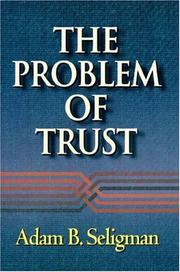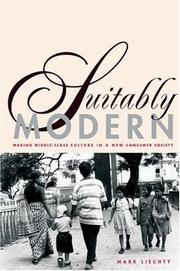| Listing 1 - 3 of 3 |
Sort by
|

ISBN: 0691050201 0691012423 1400822378 1400813360 9780691050201 9780691012421 1400807247 Year: 1997 Publisher: Princeton (N.J.): Princeton university press,
Abstract | Keywords | Export | Availability | Bookmark
 Loading...
Loading...Choose an application
- Reference Manager
- EndNote
- RefWorks (Direct export to RefWorks)
The problem of trust in social relationships was central to the emergence of the modern form of civil society and much discussed by social and political philosophers of the early modern period. Over the past few years, in response to the profound changes associated with postmodernity, trust has returned to the attention of political scientists, sociologists, economists, and public policy analysts. In this sequel to his widely admired book, The Idea of Civil Society, Adam Seligman analyzes trust as a fundamental issue of our present social relationships. Setting his discussion in historical and intellectual context, Seligman asks whether trust--which many contemporary critics, from Robert Putnam through Francis Fukuyama, identify as essential in creating a cohesive society--can continue to serve this vital role.Seligman traverses a wide range of examples, from the minutiae of everyday manners to central problems of political and economic life, showing throughout how civility and trust are being displaced in contemporary life by new "external' system constraints inimical to the development of trust. Disturbingly, Seligman shows that trust is losing its unifying power precisely because the individual, long assumed to be the ultimate repository of rights and values, is being reduced to a sum of group identities and an abstract matrix of rules. The irony for Seligman is that, in becoming postmodern, we seem to be moving backward to a premodern condition in which group sanctions rather than trust are the basis of group life.
Political sociology --- Political systems --- Social psychology --- #SBIB:35H501 --- 316.47.052 --- Bestuur en samenleving: netwerken, inspraak, participatie, interactief beleid --- Vertrouwen in sociale relaties --- 316.47.052 Vertrouwen in sociale relaties --- Social role --- Role, Social --- Social interaction. --- Trust. --- Social role. --- Social interaction --- Trust --- Human interaction --- Interaction, Social --- Symbolic interaction --- Trust (Psychology) --- Social status --- Exchange theory (Sociology) --- Psychology --- Attitude (Psychology) --- Emotions --- Agape. --- Appadurai, Arjun, "ed. --- Arendt, Hannah. --- Axial chasm. --- Banfield, Edward. --- Benhabib, Seyla. --- Bernstein, Basil. --- Boden, Deirdre. --- Bynum, Caroline. --- Calvinism. --- Cambridge Platonists. --- Catholicism. --- Christianity. --- Constant, Benjamin. --- Diderot, Denis, "ed. --- Douglas, Mary. --- Durkheim, Emile. --- Elias, Norbert. --- Frankfurt, Harry. --- Ghana, Frafas people of. --- Grief, Avner. --- Harrison, Bernard, "ed. --- Herman, Gabriel. --- Kahneman, Daniel. --- Lasch, Christopher. --- Macfarlane, Alan. --- Maza, Sarah. --- Merton, Robert. --- Otto, Rudolf. --- Protestantism. --- Puritanism. --- asceticism. --- associational life. --- baptism, private. --- capitalism. --- citizenship. --- civility. --- communitarianism. --- confidence. --- contract law. --- credit, symbolic. --- divorce. --- expectation, trust as. --- externality. --- familiarity. --- friendship. --- game theory. --- honor. --- incivisme. --- marriage. --- networks, of trust. --- postmodernity. --- Rol social. --- Interacción social. --- Interaction sociale --- Role (Sociology) --- Confiance --- Rôle social

ISBN: 069100661X 0691006628 9780691006628 9780691006611 069122241X Year: 2000 Publisher: Princeton: Princeton university press,
Abstract | Keywords | Export | Availability | Bookmark
 Loading...
Loading...Choose an application
- Reference Manager
- EndNote
- RefWorks (Direct export to RefWorks)
Alexander Schuessler has done what many deemed impossible: he has wedded rational choice theory and the concerns of social theory and anthropology to explain why people vote. The "paradox of participation"--why individuals cast ballots when they have virtually no effect on electoral outcomes--has long puzzled social scientists. And it has particularly troubled rational choice theorists, who like to describe political activity in terms of incentives. Schuessler's ingenious solution is a "logic of expressive choice." He argues in incentive-based (or "economic") terms that individuals vote not because of how they believe their vote matters in the final tally but rather to express their preferences, allegiances, and thus themselves. Through a comparative history of marketing and campaigning, Schuessler generates a "jukebox model" of participation and shows that expressive choice has become a target for those eliciting mass participation and public support. Political advisers, for example, have learned to target voters' desire to express--to themselves and to others--who they are. Candidates, using tactics such as claiming popularity, invoking lifestyle, using ambiguous campaign themes, and shielding supporters from one another can get out their vote even when it is clear that an election is already lost or won. This important work, the first of its kind, will appeal to anyone seeking to decipher voter choice and turnout, social movements, political identification, collective action, and consumer behavior, including scholars, graduate students, and upper-level undergraduates in political science, economics, sociology, anthropology, and marketing. It will contribute greatly to our understanding and prediction of democratic participation patterns and their consequences.
Rational choice theory --- Voting --- Political participation --- Rational choice theory. --- Social choice --- Ansolabehere, Stephen. --- Appadurai, Arjun. --- Bartels, Larry. --- Bonaccorso, John. --- Brennan, Geoffrey. --- Carter, Jimmy. --- Clinton, Bill. --- Diamond, Edwin. --- Durkheim, Emile. --- Edelman, Murray. --- Eisenhower, Dwight D. --- Ferejohn, John. --- Giddens, Anthony. --- Goodman, Robert. --- Haug, Wolfgang. --- Herbst, Susan. --- Hotelling, Harold. --- Iyengar, Shanto. --- Jamieson, Kathleen Hall. --- Johnson, Lyndon. --- King, Gary. --- Lennon, John. --- Lennons Problem. --- Lifestyle. --- Mickelson, Sig. --- Nagler, Jonathan. --- Nixon, Richard. --- Olson, Mancur. --- Page, Benjamin. --- Riker, William. --- Scib. --- Tedlow, Richard. --- Verba, Sidney. --- Walker, Mary. --- Wright, Gerald. --- abstention. --- bandwagons (momentum). --- biographical narratives. --- chaos theorem. --- commodification. --- composition of utility. --- electoral campaigns. --- expressive tipping model. --- free-riding. --- identity (attachment). --- marketing. --- opinion polls. --- paradox of participation. --- participation costs. --- public goods. --- rational ignorance. --- selective incentives. --- snob-good. --- turnout. --- Voting. --- Political participation. --- Balloting --- Polls --- Elections --- Politics, Practical --- Suffrage --- Citizen participation --- Community action --- Community involvement --- Community participation --- Involvement, Community --- Mass political behavior --- Participation, Citizen --- Participation, Community --- Participation, Political --- Political activity --- Political behavior --- Political rights --- Social participation --- Political activists

ISBN: 0691095922 0691095930 069122174X Year: 2003 Publisher: Princeton University Press
Abstract | Keywords | Export | Availability | Bookmark
 Loading...
Loading...Choose an application
- Reference Manager
- EndNote
- RefWorks (Direct export to RefWorks)
Suitably Modern traces the growth of a new middle class in Kathmandu as urban Nepalis harness the modern cultural resources of mass media and consumer goods to build modern identities and pioneer a new sociocultural space in one of the world's "least developed countries." Since Nepal's "opening" in the 1950s, a new urban population of bureaucrats, service personnel, small business owners, and others have worked to make a space between Kathmandu's old (and still privileged) elites and its large (and growing) urban poor. Mark Liechty looks at the cultural practices of this new middle class, examining such phenomena as cinema and video viewing, popular music, film magazines, local fashion systems, and advertising. He explores three interactive and mutually constitutive ethnographic terrains: a burgeoning local consumer culture, a growing mass-mediated popular imagination, and a recently emerging youth culture. He shows how an array of local cultural narratives--stories of honor, value, prestige, and piety--flow in and around global narratives of "progress," modernity, and consumer fulfillment. Urban Nepalis simultaneously adopt and critique these narrative strands, braiding them into local middle-class cultural life. Building on both Marxian and Weberian understandings of class, this study moves beyond them to describe the lived experience of "middle classness"--how class is actually produced and reproduced in everyday practice. It considers how people speak and act themselves into cultural existence, carving out real and conceptual spaces in which to produce class culture.
Consumption (Economics) --- Middle class --- Kathmandu (Nepal) --- Social conditions. --- Bourgeoisie --- Commons (Social order) --- Middle classes --- Social classes --- Consumer demand --- Consumer spending --- Consumerism --- Spending, Consumer --- Demand (Economic theory) --- Social conditions --- Catmandoo (Nepal) --- Katmandu (Nepal) --- Khatmandu (Nepal) --- Chia-te-man-tu (Nepal) --- Kāṭhamāḍauṃ (Nepal) --- Yem̐ (Nepal) --- Yam̐ (Nepal) --- Yẹn (Nepal) --- Kāṭhamāṇḍau (Nepal) --- Kāntipura (Nepal) --- Kantipur (Nepal) --- KTM (Nepal) --- Appadurai, Arjun. --- Barthes, Roland. --- British colonialism in South Asia. --- Butler, Judith. --- Doordarshan. --- Douglas, Mary. --- Foucault, Michel. --- Fuglesang, Minou. --- Japan. --- Kakar, Sudhir. --- Kett, Joseph. --- Kluge, Alexander. --- Musical Hour. --- Nepali, G. S. --- Rana era. --- Ranas. --- Schein, Louisa. --- Simmel, Georg. --- Sloane, Patricia. --- Somers, Margaret. --- Thapa, Bhim Sen. --- Weber, Max. --- Wilson, Elizabeth. --- code switching. --- consumer society. --- consumption. --- cultivation effect. --- development. --- drugs (illegal). --- education. --- embodiment. --- gender. --- globalization. --- magazines. --- media assemblage. --- media: and imagination. --- modernity. --- nationalism. --- prostitution. --- radio. --- remittance economy. --- sumptuary laws. --- television. --- tourism. --- video. --- youth culture. --- classe moyenne. --- classe moyenne --- Consommation --- Classes moyennes --- Middle class. --- Société de consommation --- Descriptive sociology --- Social history --- History --- Sociology --- societe de consommation --- Katmandou (Nepal) --- Nepal --- Nepal. --- Katmandou (Népal) --- Nīpāl --- Ni-po-erh --- Nepāḥ --- Nepal Adhirajya --- Kingdom of Nepal --- Nepāla --- Federal Democratic Republic of Nepal --- Sanghiya Loktāntrik Ganatantra Nepāl --- Непал --- Savezna Demokratska Republika Nepal --- República Federal Democràtica del Nepal --- Kongeriget Nepal --- Demokratische Bundesrepublik Nepal --- Νεπάλ --- Nepalo --- Federacia Demokratia Respubliko Nepalo --- República Federal Democrática de Nepal --- Nepali Demokraatlik Liitvabariik --- Nepalgo Errepublika Demokratiko Federala --- Nepalin demokraattinen liittotasavalta --- République démocratique fédérale du Népal --- נפאל --- Sambandslýðveldið Nepal --- ネパール --- Nepāru --- 네팔 --- Nepalia --- Federale Democratische Republiek Nepal --- Nepālas Federālā Demokrātiskā Republika --- Федеративная Демократическая Республика Непал --- Federativnai︠a︡ Demokraticheskai︠a︡ Respublika Nepal --- Савезна Демократска Република Непал --- Республіка Непал --- Respublika Nepal --- Федеративна Демократична Республіка Непал --- Federatyvna Demokratychna Respublika Nepal --- Cộng hòa dân chủ liên bang Nepal --- 尼泊尔 --- Nibo'er --- Conditions sociales. --- Classe moyenne --- Petite bourgeoisie --- Hommes des classes moyennes --- Femmes des classes moyennes --- Classes sociales --- Consommation (économie politique) --- Consommation (théorie économique) --- Dépenses de consommation --- Consommation de tabac --- Consommateurs --- Consommation collaborative --- Cyberconsommation --- Consommation durable --- Abondance (économie politique) --- Coopératives de consommation --- Crédit à la consommation --- Impôt sur la consommation --- Indice des prix à la consommation --- Pouvoir d'achat --- Prix --- Rationnement --- Société de consommation --- Demande (économie politique) --- Comportement --- Federativnai͡a Demokraticheskai͡a Respublika Nepal --- Nepā --- Kātmāndu (Népal) --- Kathmandou (Népal) --- Kathmandu (Népal) --- Kāṭhamāṃḍū (Népal) --- काठमांडू (Népal) --- Kāṭhamāḍauṃ (Népal) --- काठमाडौं (Népal) --- Kāṭhmāḍaṃ (Népal) --- काठ्माडौं (Népal) --- Kāntipura (Népal) --- कन्तिपुर (Népal) --- Kantipur (Népal) --- Kāntipura nagara (Népal) --- कान्तिपुर नगर (Népal) --- Yeṃdey (Népal) --- येंदेय् (Népal) --- Théorie de la culture de consommation --- Attitude
| Listing 1 - 3 of 3 |
Sort by
|

 Search
Search Feedback
Feedback About UniCat
About UniCat  Help
Help News
News